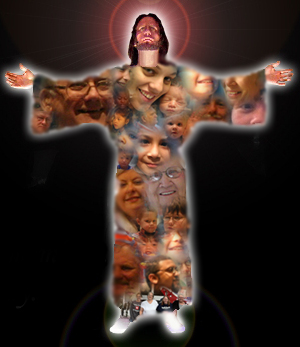
– 07 August 2022-
Shorter Gospel Text: Luke 12:35-40
vs.35 Jesus said to his disciples:
“See that you are dressed for action and have your lamps lit.
vs.36 Be like men waiting for their master to return from the wedding feast, ready to open the door as soon as he comes and knocks.
vs.37 Happy those servants whom the master finds awake when he comes. I tell you solemnly, he will put on an apron, sit them down at table and wait on them.
vs.38 It may be in the second watch he comes, or in the third, but happy those servants if he finds them ready.
vs.39 You may be quite sure of this, that if the householder had known at what hour the burglar would come, he would not have let anyone break through the wall of his house.
vs. 40 You too must stand ready, because the Son of Man is coming at an hour you do not expect.”
************************************************
We have four commentators available from whom you may wish to choose .
Michel DeVerteuil : Trinidadian Holy Ghost Priest, director of the Centre of Biblical renewal .
Thomas O’Loughlin: He is on the theology faculty of Nottingham University
Sean Goan: Studied scripture in Rome, Jerusalem and Chicago and teaches at Blackrock College
and works with Le Chéile.
Donal Neary SJ: Editor of The Sacred Heart Messenger
*******************************************************
Michel de Verteuil
Lectio Divina The Year of Luke
www.columba.ie
Textual comments
The gospel passage for this Sunday consists of sayings of Jesus, so it would be good to look first at some general principles that must be respected in interpreting sayings.
Firstly remember, , that in gospel meditation a passage must be read very slowly. I mention this because the sayings of Jesus are short, and often people tend to read them quickly. This happens especially in a passage like this, where we have several sayings on one general theme. It is, however, not a logically constructed teaching, but a collection of sayings, each one different and with its own way of putting across the theme. We must therefore take them separately, letting each one in turn rest in our hearts. Each one is like a special wine, and God invites us to be connoisseurs who take time to savour each one and discover its distinctive flavour.
Secondly, the sayings of Jesus are usually metaphors, speaking to our imagination. This is another point that we are inclined to forget, because in the modern Western world teachers speak in the abstract and to the reason. We must make an effort to stir up our feelings, bringing back memories of our own deep experience, or the experience of people who have touched our lives. In this way we discover for ourselves the truth of the sayings, and within this process we experience God calling us to spiritual growth. This will take time, especially when – as we shall see in some of the sayings in this passage – the metaphor is complex and leads us in more than one direction.
Finally, the sayings of Jesus are universally true. Many people read them as true only of our relationship with God, and of spiritual growth. But they also apply to what happens to our Church communities, our village, our country, and the world. We must be open to discovering this universality, so that gradually (it always takes time) we enter into the many ways in which the saying is true.
The Metaphor of Waiting
All the sayings in this passage are about waiting. This is a difficult metaphor for us today, because in our culture we experience waiting as something negative. “I am waiting” means that I am doing nothing and furthermore that I resent it: “How could you keep me waiting?”
For the Bible, however – and this is good common sense – waiting is a creative moment, or at least can be if we enter freely into it. When I wait for others, I give them the space to be themselves, paying them the respect of letting them exercise their creativity, and I do it not with indifference or grudgingly, but with love, so that we can walk together in solidarity and mutual enrichment.
It is in this perspective that we must understand the Bible expression ‘waiting for God’, which we find, for example, in Psalm 146:
“His delight is not in horses nor his pleasure in warrior strength.
The Lord delights in those who revere him, in those who wait for his love.”
People sometimes imagine God sitting in heaven and looking down at his creatures. God in the Bible is not like this at all. “My Father goes on working,” St John quotes Jesus saying, “and so do I.” God is always at work in our lives, in the lives of others and in the world, and this work is always to break the rod of the  oppressor and to set captives free.
oppressor and to set captives free.
To wait for God is, then, to say to him that we know he is at work, and we are prepared to let him carry our his loving purpose when and how he pleases. At times, of course, we become impatient, and even panic and cry out, “How long, O Lord!” But at other times, we feel able to make our act of adoration and tell God that we are willing to wait for him.
The moment is also creative for ourselves. When we wait, our latent tendencies to dominate and manipulate come to the surface, so that we are open to experiencing this as a moment of grace – we will go beyond these evil tendencies and enter that deep inner space where we are in trusting communion with God and with one another; free in ourselves and allowing others to be free.
As you read this passage, then, and enter into the various sayings, remember waiting experiences that were moments of grace for you or for others. The times when you were able to wait for a child or a friend, and, at some unexpected moment, they opened up to you and you entered into a new and deeper relationship with them.
Perhaps you struggled for years with drinking or drugs or an unhealthy relationship; you went through agony, unable to make up your mind about moving into a new life-style; and then one day the way became perfectly clear and easy; reading this passage today, you realize what it means to wait for God’s moment.
Be with people you know who are tired of waiting; read the passage in solidarity with them, letting the message flow through you so that it touches them and renews their courage.
Waiting is important in our relationship with a community too, a church community or any other. So often we try to manipulate a community rather than letting it grow organically according to its own dynamic. As you read this passage, remember great leaders you have known who have trusted the community, knew how to wait for it, according to the saying that everything happens in its own time; and so, when the moment came, the growth was solid, “the seed grew tall and strong,” as Jesus expressed it in the Parable of the Sower.
This teaching on waiting is tremendously important today, when influencing people has become a skill that can be acquired like any other; when people boast openly that given sufficient money, they can make the public buy anything, not excluding a President or Prime Minister at election time. In this cultural context, we Christians will be tempted to think that grace can also be manipulated in this way, and that
if only we could buy more time on television, or if our religious magazines were more glossy,
or if we could work more sensational miracles, people would be converted. These sayings remind us that the laws of spiritual growth are different, and we remember with gratitude that in this area earthly power achieves little, but there is real power in trust, care and compassion – all that is implied in waiting.
Our age needs this teaching for another reason too. The Church communities of the New Testament time had little social or political influence. We tend to forget this, because the Roman Emperor became a Christian and, before long, Christianity became the official religion of the State. In the early years, however, there was no prospect whatsoever that this would ever happen. We can see why, in such a context, there was so much emphasis on a self-confident faith which would enable Christians to look calmly at the great Roman Empire and still believe that the values of Jesus Christ would triumph in the end.
 The metaphor of waiting expressed perfectly this kind of faith. Can we not say that this is precisely the faith we need today – a trust in the power of our values that takes away any great need for success or quick results?
The metaphor of waiting expressed perfectly this kind of faith. Can we not say that this is precisely the faith we need today – a trust in the power of our values that takes away any great need for success or quick results?
Remembering the importance of this teaching, let us now turn to the collection of sayings.
Verse 35. A friend has told you that he will take you out for a pint, but it is now very late and he hasn’t turned up. Your parents, all your brothers and sisters have gone to bed, and you are still there, dressed to go out, and the lights in the house are still on. Your mother puts her head out of her room, “You still waiting? Why don’t you go to bed?” You shake your head stubbornly, “I know he will come.” Jesus is telling us that faith in him is like that; everybody else has sold out to the prevailing value system, they have fallen asleep, as it is often expressed in the New Testament, but you continue to believe that the values of Jesus will come good. We think with gratitude of Martin Luther King saying, as he received the Noble Peace Prize,
“I still believe that unarmed truth and unconditional love will have the final word in reality.”
Note that the saying is in the form of a command – “see that…” – which can be interpreted in two ways. It can be read as a warning – “better be careful or you will fall away like everyone else.” But it can also be a word of encouragement – “Don’t worry about all the negative signs you see all around you; I can promise you that I am coming soon.” Either way, we see here the role of the Church or of the individual Christian to be the voice of Jesus in the World today.
Verse 36 points us in a new direction. We are waiting for a master who is away at a wedding feast. We Christians live in the real world with all its selfishness and its fragmentation; but we know that our master is celebrating a world of harmony and reconciliation, and the vision of that world gives direction and hope to our lives.
The verse also evokes for us the moment of grace always coming suddenly, as we saw above; and we  respond immediately or not at all:
respond immediately or not at all:
“There is a tide in the affairs of men,
which taken at the flood leads on to fortune;
omitted, all the voyage of their life is bound in shallows and miseries.”
…W. Shakespere
Remember the times when God knocked, fresh from the celebration of harmony, and somehow or other you were able to open immediately; you were able to give up that bad habit, to forgive, to move into a new and deeper relationship. Pray for those you know who are struggling that they may continue to wait in trust, ready to open the door as soon as the Lord comes and knocks.
Verse 37 focuses on the blessedness that comes over us when we have waited long and eventually experienced the moment of grace. It is as if a great and generous master whom we admire greatly, has put on an apron, has sat us down at table and is attending to our every need. We feel perfectly secure, all our anxieties have vanished, and we know that it has not been our achievement – he who is mighty has done great things to his servant.
Verse 38 reminds us that waiting always seems long, just as the hours of the night seem longer than we had bargained for.
You thought it would be for the first watch, but it isn’t;
it must surely be the second then, but it isn’t;
and you realize that it mightn’t be the third either.
Is not the fulfillment of our deepest aspirations like that? Who was the Jesus that God sent into your life to encourage you to continue waiting?
In verse 39 the metaphor shifts again. It is the moment when a person recognizes humbly, “he fooled me again” – the boxer became careless and let his guard drop; defenders were over-confident and let the forwards come through to score. I thought I was beyond lust and jealousy; our community was acting as if ambition, racism or snobbishness were dead among us; now we look ruefully at the wall of our house in a shambles and we reflect that if we had known at what hour the burglar would come we would not have let anyone break through it. We should not read this verse with bitterness, nor should we understand it to say that we must spend our whole lives on guard. God is inviting us to laugh at ourselves, caught out once again, and we know that a humble and contrite heart is worth more than tens of thousands of fatted lambs offered in sacrifice.
The “Son of Man” in verse 40 is a messianic term, the Saviour, the great leader whom God sends to rescue the oppressed.  This verse is therefore a call to renewed hope. It is Isaiah and John the Baptist and all the prophets proclaiming to those who feel lost and abandoned not to lose heart because just at the moment when they feel most lost, the moment when they least expect it, God will intervene to save them. Remember when you experienced the truth of this saying, the times when you were just about to despair and against all the odds, the Son of Man came. Now say this to others: “You too must stand ready.”
This verse is therefore a call to renewed hope. It is Isaiah and John the Baptist and all the prophets proclaiming to those who feel lost and abandoned not to lose heart because just at the moment when they feel most lost, the moment when they least expect it, God will intervene to save them. Remember when you experienced the truth of this saying, the times when you were just about to despair and against all the odds, the Son of Man came. Now say this to others: “You too must stand ready.”
******************************************
Thomas O’Loughlin
Liturgical Resources for the Year of Luke
www.Columba.ie
Introduction to the Celebration
 The gospel today reminds us that we must ‘stand ready’ for the return of the Lord. We must be people who are ‘dressed for action’ and have our ‘lamps lit’ and be those who are ‘found awake’. Let us reflect on how we are often not quite up to the mark or have ‘postponed till later’ the call to witness to Jesus.
The gospel today reminds us that we must ‘stand ready’ for the return of the Lord. We must be people who are ‘dressed for action’ and have our ‘lamps lit’ and be those who are ‘found awake’. Let us reflect on how we are often not quite up to the mark or have ‘postponed till later’ the call to witness to Jesus.
Gospel Notes
While this material is not found only in Luke, it is so transformed by him that it can be treated as if it were found only in his gospel. Verse 35 marks the beginning of a section on watchfulness and faithfulness so that the disciples are ready for the moment when ‘the Son of Man’ returns. However, the internal elements seem to concern those who are the servants and stewards of the community: if they do their task well and persevere in it, then they will be rewarded with a reversal of roles. Having been servants of the master’s table, then they will be given seats and waited upon by the master. Meanwhile, they must be careful in how they carry out their tasks for they do not know when he will return.
We can read this gospel in two ways.
First, it can be read as a general warning ‘to be alert’ for the Lord’s return — a theme found in many places in the gospels.
Second, as a warning intended primarily for those with special positions in the churches where Luke preached that they be good servants of those churches.
Homily Notes
1. This is one of those Sundays when the readings are not really suitable for exposition in a homily of between five and ten minutes. That does no mean that there is not much that could be preached upon in them; rather it is a case that to give a homily that would offer something to an average congregation, while building directly on the readings, would probably need longer than is usually available. So one way around this is to link the gospel to another text which can be expounded in the space of five-ten minutes.
 2. The gospel says we have to be ready for the Son of Man to come again among us? So who are we who must stand ready, with our lamps lit? An answer is provided in Preface of Sundays in Ordinary Time I:
2. The gospel says we have to be ready for the Son of Man to come again among us? So who are we who must stand ready, with our lamps lit? An answer is provided in Preface of Sundays in Ordinary Time I:
We are the people freed from sin by Christ’s cross and resurrection. We ‘stand ready’ every time we celebrate this paschal mystery, as we are doing now.
We are the people who have been called to the life of glory, we are united with Christ Jesus in baptism.
We have become a chosen race, a royal priesthood, a holy nation, a people set apart.
 3. And if this is who we are, then standing ready means that we have certain tasks entrusted to us. Everywhere we must proclaim God’s mighty works. Why? Because we have been called out of darkness into the wonderful light of God
3. And if this is who we are, then standing ready means that we have certain tasks entrusted to us. Everywhere we must proclaim God’s mighty works. Why? Because we have been called out of darkness into the wonderful light of God
********************************************
Sean Goan
Let the Reader Understand
www.Columba.ie
Gospel notes
The idea that the kingdom of God is both a gift and a challenge is very present in the extract from the gospel that is put before us today. The encouraging opening words inspire confidence in the hearers as Jesus reminds his ‘little flock’ that there is no need for fear because the kingdom has been given. So if the disciples are not to fear, what should they do? Jesus answers this question in a most challenging way by telling them to think differently about the world and their place in it. They should not be concerned about wealth or the exercise of power; rather they should busy themselves doing what the Lord asks of them as any good servant would do.  Jesus puts it to his disciples very sternly — much has been given you, so much will be expected from you. This is not to inspire fear but to inspire reflection on how gifted we truly are.
Jesus puts it to his disciples very sternly — much has been given you, so much will be expected from you. This is not to inspire fear but to inspire reflection on how gifted we truly are.
Reflection
Both today’s readings highlight the meaning of faith, and stress that it has more to do with trusting in God than it has with believing certain truths. On the night of Passover the Israelites, who were a powerless band of runaway slaves, were escaping from the greatest empire in the world. They were heading out into the wilderness not knowing their final destination.
Equally Abraham and Sarah were asked to set out for a land they did not know and to leave everything with which they were familiar.
In following Christ, we too are asked to take God’s hand and to follow a path which is often at odds with the values of the world in which we live. We are to be Christ’s instruments as he reaches out to those most in need.
**********************************
4. Donal Neary S.J.
Gospel reflections for Year C: Luke
www.messenger.ie/bookshop/
Looking after his business
When you go away and want someone to mind the house, you plan well and invest in someone safe. We often need that. Who will monitor the alarm and keep an eye on the house?
 Same with Jesus… the people of the gospel are the ones who look after his business while he is away! God invests in us. He wants us to do our best in minding his house. His community and Church are the people to whom he entrusts his life’s work.
Same with Jesus… the people of the gospel are the ones who look after his business while he is away! God invests in us. He wants us to do our best in minding his house. His community and Church are the people to whom he entrusts his life’s work.
We spread the kingdom in simple ways every day – care, hospitality, work for justice, compassion, with the gifts and talents we have. He has given us the gifts – we are to use them in his service. We do our best and God, the architect, is continually building with us.
He is the extra presence around in his Spirit. So when we do things in his service, he is the inspirer. But he leaves a lot to us.
And then when in his service he feeds us. He works with us and for us. The slave/master relationship is turned upside down. People would never expect that the master would serve the meal – like at the washing of the feet. We are nourished and renewed.
 There is a need now for volunteer help within the Church -we need it now and will in the future. Formation is needed for people who can hand on faith when the parish may be called onto do more, and to do what the Catholic school has done until now.
There is a need now for volunteer help within the Church -we need it now and will in the future. Formation is needed for people who can hand on faith when the parish may be called onto do more, and to do what the Catholic school has done until now.
The kingdom is spread through the work of the Church, and we are this Church, this body of Christ. We are the true blessed sacraments of Jesus Christ.
***************************
